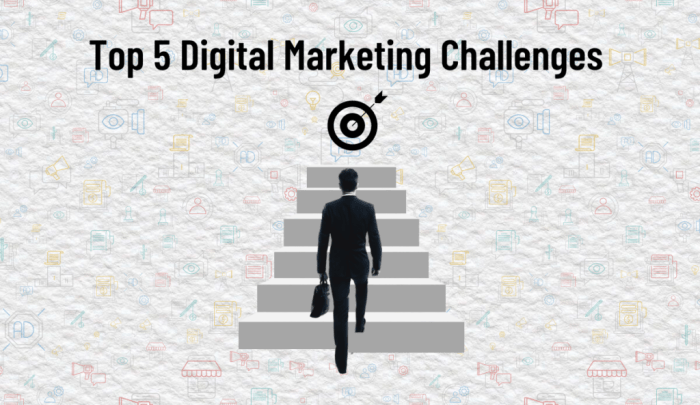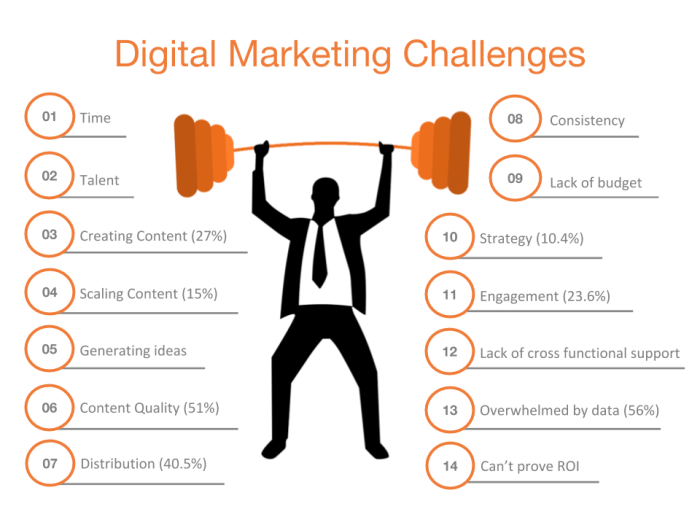Overcoming common challenges in the digital marketing industry is a journey of constant adaptation and innovation. The digital landscape is a dynamic and ever-evolving space, presenting marketers with a unique set of hurdles to overcome. From navigating budget constraints and proving ROI to staying ahead of algorithm changes and managing brand reputation, the path to success requires strategic thinking, resilience, and a commitment to continuous learning.
This exploration will illuminate effective strategies for navigating these complexities and unlocking the true potential of digital marketing.
This guide provides practical solutions and actionable insights for digital marketers at all levels. We’ll delve into effective budget allocation techniques, explore robust ROI measurement methods, and offer strategies for thriving amidst algorithm updates and fierce competition. Furthermore, we’ll examine best practices for building a strong online brand presence, ensuring data privacy compliance, and leveraging emerging technologies. By understanding and proactively addressing these common challenges, businesses can transform their digital marketing efforts into powerful engines of growth and lasting success.
Building and Maintaining Brand Reputation: Overcoming Common Challenges In The Digital Marketing Industry

In today’s hyper-connected world, a strong online reputation is no longer a luxury—it’s a necessity for any business, regardless of size or industry. A positive brand image fosters trust, attracts customers, and ultimately drives revenue. Conversely, a tarnished reputation can lead to significant losses and irreparable damage. Building and maintaining a stellar online presence requires proactive strategies and a commitment to consistent excellence.Online reviews and reputation management are critical components of a successful digital marketing strategy.
They directly impact consumer perception and purchasing decisions. Positive reviews act as social proof, reassuring potential customers of a brand’s quality and reliability. Conversely, negative reviews, if left unaddressed, can quickly spiral into a public relations nightmare.
The Importance of Online Reviews and Reputation Management
Online reviews significantly influence consumer behavior. Sites like Yelp, Google Reviews, and TripAdvisor are frequently consulted before making purchasing decisions. A high volume of positive reviews demonstrates a brand’s commitment to customer satisfaction and builds credibility. Conversely, negative reviews, even if few in number, can deter potential customers. Proactive reputation management involves actively monitoring online reviews, responding to both positive and negative feedback, and employing strategies to improve overall online sentiment.
This includes using tools to track mentions of your brand across various platforms and implementing a system for promptly addressing customer concerns. A consistent and transparent approach to reputation management builds trust and strengthens the brand’s image.
Strategies for Handling Negative Online Reviews and Feedback
Negative reviews are inevitable. The key is not to avoid them, but to address them professionally and constructively. A swift and empathetic response demonstrates a commitment to customer satisfaction. Publicly acknowledging the issue and offering a sincere apology, even if the customer is at fault, can significantly mitigate the damage. It’s important to move the conversation offline if possible, to avoid airing grievances publicly.
Offering a solution or compensation can further demonstrate a commitment to rectifying the situation. For example, a company might offer a refund, a discount on future purchases, or a replacement product. Transparency and a genuine desire to resolve the issue are crucial in turning a negative experience into a positive one. Ignoring negative reviews, on the other hand, can often amplify the problem.
Building a Strong Online Community Around a Brand, Overcoming common challenges in the digital marketing industry
Cultivating a strong online community fosters brand loyalty and provides valuable feedback. This can be achieved through various channels, including social media, forums, and email newsletters. Engaging with followers, responding to comments and questions, and hosting online events can create a sense of connection and belonging. Running contests and giveaways can also boost engagement and increase brand awareness.
Encouraging user-generated content, such as reviews and photos, can further enhance the brand’s online presence. By fostering a supportive and inclusive online community, businesses can build a loyal customer base and generate positive word-of-mouth marketing.
Examples of Brands That Have Successfully Managed Their Online Reputation
Many brands have successfully navigated the challenges of online reputation management. Dove’s “Real Beauty” campaign, for example, resonated with consumers by promoting body positivity and self-acceptance. This created a positive online community and fostered a strong brand reputation. Similarly, companies like Patagonia, known for their commitment to sustainability and ethical practices, have cultivated a loyal following through consistent messaging and transparent communication.
Their commitment to their values resonates with consumers, leading to positive online sentiment and strong brand loyalty. These examples highlight the importance of aligning brand values with consumer expectations and actively engaging with the online community.
Data Privacy and Compliance

In today’s digital landscape, trust is paramount. Building and maintaining that trust requires a steadfast commitment to data privacy and compliance. Ignoring data privacy regulations not only risks hefty fines and legal battles but also irrevocably damages your brand’s reputation, potentially driving away customers who value their personal information. Prioritizing data privacy isn’t just a legal obligation; it’s a crucial element of responsible business practice and a key driver of customer loyalty.Data privacy regulations, such as the General Data Protection Regulation (GDPR) in Europe and the California Consumer Privacy Act (CCPA) in the United States, establish strict guidelines for how businesses collect, store, use, and protect personal data.
Adherence to these regulations is essential for maintaining ethical and legal operations, fostering customer trust, and avoiding potentially devastating consequences. Understanding and implementing best practices is vital for navigating the complex world of data privacy.
Importance of Adhering to Data Privacy Regulations
The importance of adhering to data privacy regulations like GDPR and CCPA cannot be overstated. These regulations empower individuals with control over their personal data, granting them rights such as access, rectification, erasure, and data portability. Non-compliance can lead to significant financial penalties, reputational damage, and loss of customer trust. For instance, a company failing to comply with GDPR could face fines up to €20 million or 4% of its annual global turnover – a substantial deterrent.
Furthermore, negative publicity surrounding a data breach can severely impact a company’s brand image and customer loyalty, potentially leading to long-term financial losses. Building a culture of compliance is therefore not merely a legal imperative, but a strategic necessity for sustainable business growth.
Best Practices for Data Privacy
Implementing robust data privacy practices requires a multi-faceted approach. This involves establishing clear data collection policies, obtaining explicit consent from users, implementing strong security measures to protect data from unauthorized access, and ensuring data is only used for its intended purpose. Regular data audits and employee training on data privacy best practices are crucial for maintaining compliance. Employing encryption techniques, both in transit and at rest, is vital to safeguarding sensitive customer information.
Furthermore, implementing data minimization principles – collecting only the necessary data – significantly reduces the risk of breaches and simplifies compliance efforts. Regularly reviewing and updating data privacy policies to reflect evolving regulations and best practices is also essential.
Examples of Data Privacy Breaches and Their Consequences
Numerous high-profile data breaches serve as stark reminders of the potential consequences of neglecting data privacy. The Equifax breach in 2017, for example, exposed the personal information of nearly 150 million people, resulting in significant financial losses for Equifax, lawsuits, and lasting damage to its reputation. Similarly, the Cambridge Analytica scandal highlighted the risks of inadequate data protection and the potential for misuse of personal data for political manipulation.
These examples underscore the importance of proactive measures to prevent data breaches and the potentially devastating impact on a company’s reputation and financial stability. The long-term effects can include loss of customer trust, decreased brand value, and substantial legal and regulatory penalties.
Data Privacy Compliance Checklist
A comprehensive checklist is crucial for ensuring ongoing compliance with data privacy regulations. This checklist should include regular reviews of data collection practices, verification of consent mechanisms, assessments of data security measures, and confirmation of data retention policies. The checklist should also incorporate employee training programs on data privacy best practices and procedures for handling data breach incidents.
Regular audits of data processing activities, and updates to data privacy policies to reflect evolving legal and regulatory landscapes, are also essential components. This proactive approach helps to minimize risk and maintain a strong commitment to data privacy.
Keeping Up with Emerging Technologies

The digital marketing landscape is in constant flux, driven by the rapid advancement of technology. Staying ahead of the curve requires a proactive approach, embracing emerging technologies not just as trends, but as powerful tools to enhance marketing strategies and achieve greater success. Ignoring these advancements risks falling behind competitors who are effectively leveraging the latest innovations.The impact of emerging technologies like Artificial Intelligence (AI), Virtual Reality (VR), and Augmented Reality (AR) is profound and multifaceted.
These technologies are reshaping how businesses connect with their audiences, personalize experiences, and measure campaign effectiveness. Successful adoption requires understanding their capabilities and potential, while also acknowledging the challenges involved in implementation.
AI’s Influence on Digital Marketing Strategies
AI is revolutionizing various aspects of digital marketing. From automating repetitive tasks like social media scheduling and email marketing to providing data-driven insights for campaign optimization, AI enhances efficiency and effectiveness. Machine learning algorithms analyze vast datasets to identify patterns and predict consumer behavior, enabling marketers to personalize messaging and target audiences with greater precision. For example, Netflix utilizes AI-powered recommendation engines to suggest shows and movies tailored to individual user preferences, significantly boosting engagement and subscriber retention.
This level of personalization fosters stronger customer relationships and improves conversion rates.
Leveraging VR/AR for Immersive Brand Experiences
VR and AR offer exciting opportunities to create immersive brand experiences that engage consumers on a deeper level. VR allows customers to virtually “try before they buy,” experiencing products in a realistic setting. Imagine trying on clothes virtually without leaving your home, or exploring a new car’s interior from the comfort of your living room. AR overlays digital information onto the real world, enhancing the shopping experience and providing interactive product demonstrations.
For example, IKEA uses AR apps that allow customers to visualize how furniture would look in their homes before purchasing, significantly reducing the risk of buyer’s remorse. These immersive experiences build brand loyalty and drive sales.
Successful Businesses Utilizing Emerging Technologies
Many businesses are successfully leveraging emerging technologies to improve their marketing. Sephora uses AI-powered virtual artist tools to allow customers to experiment with makeup virtually. Nike utilizes AR apps that let users virtually try on shoes and personalize their designs. These examples demonstrate the transformative power of AI and AR in creating engaging and personalized customer experiences.
Furthermore, companies like Amazon utilize AI-driven predictive analytics to anticipate customer needs and personalize product recommendations, leading to higher conversion rates and customer satisfaction.
Challenges in Adopting New Technologies
While the potential benefits are substantial, adopting new technologies also presents challenges. The initial investment in software, hardware, and training can be significant. Furthermore, integrating new technologies with existing systems requires careful planning and execution. Data security and privacy concerns must also be addressed, ensuring compliance with relevant regulations. Finally, keeping up with the rapid pace of technological advancements requires continuous learning and adaptation.
Companies must develop a culture of innovation and invest in the skills necessary to effectively manage and utilize these technologies.
The digital marketing world, while challenging, offers immense opportunities for growth and innovation. By strategically addressing budget limitations, meticulously tracking ROI, adapting to algorithm changes, and fostering a strong brand reputation, businesses can navigate the complexities of this dynamic landscape. Embracing emerging technologies and building a skilled team are crucial for long-term success. Remember, the journey is ongoing, requiring continuous learning and adaptation.
Embrace the challenges, learn from setbacks, and celebrate the victories along the way. The rewards of successful digital marketing are well worth the effort.